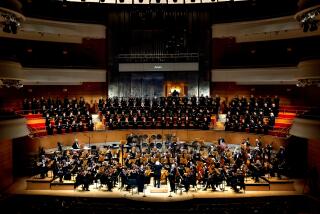Organist Will Perform a Messiaen Marathon
- Share via
WASHINGTON — A few minutes after 1 p.m. local time today, Paul Jacobs will sit down at the organ of the Basilica of the National Shrine of the Immaculate Conception and begin to play music by Olivier Messiaen. About nine hours later, after the last note of “Livre du Saint-Sacrement” (1984) dies away, Jacobs will have played every composition Messiaen wrote for the organ, all in the course of a single day.
By any standards, it is a spectacular undertaking, made even more remarkable by the fact that the 25-year-old Jacobs is still a graduate student at Yale University. Last month he presented his Messiaen marathon in Chicago, where John von Rhein, the chief music critic of the Chicago Tribune, called him “one of the most supremely gifted young organists of his generation” and declared his renditions “superb.” Further performances are scheduled for Atlanta, San Francisco, Minneapolis and Seattle.
“I loved Messiaen’s music from the first time I heard it,” Jacobs said in an interview last week. “As a boy, I was very involved with the Catholic Church, and we had one priest who was an organ fanatic. He didn’t play himself, but he loved the grandeur and holiness of the instrument. Anyway, when I was about 12 or 13, he took me to Pittsburgh to hear a program, and it changed my life.
“What I love about Messiaen is his perfect conviction and absolute power,” Jacobs continued. “I think more than ever we need to have voices that present a very specific faith and conviction. His music is full of a radiant joy, a joy that magnificently crushes the listener.”
But why a marathon, as opposed to a series of presentations? “There are a few reasons. First of all, because I’m a full-time student, it would be impossible for me to travel and present the music over six different nights. More important, this format allows a complete immersion in Messiaen’s work--more than 50 years of it. And I believe that everybody is capable of appreciating Messiaen’s music. It is perfect music, you know; everything is in perfect order and you cannot imagine a single note in any other place than it is. There’s not only intense emotion but also intelligence, real genius.”
In the 10 years since his death at age 83, Messiaen’s stature as one of the 20th century’s most influential composers has only grown. A mystic Catholic who sought inspiration from bird song and said he saw colors when he composed, he was a complex, original thinker who, from the beginning, went his own way. His music combined angular melodies, intricate rhythms and dense formal schemata in a manner that was subjective, passionate, extravagantly colorful and often swooningly romantic.
Messiaen shared Johann Sebastian Bach’s belief that all music should be written for the greater glory of God. “I have not written liturgical music but rather meditative music on the mysteries of faith,” he once said. “I want to write music that is an act of faith, a music that is about everything without ceasing to be about God.”
Like Rimsky-Korsakov and Alexander Scriabin before him, Messiaen believed that music had a strong visual aspect. “When I hear music, I hear colors,” he said, “not through my eyes but through my intellect. When I compose, I see the colors as I see the sounds.”
He described one of his harmonic sequences as going “from blue striped with green to black spotted with red and gold, by way of diamond, emerald, purplish-blue, with a dominant pool of orange studded with milky white.”
Once, while watching a ballet, he got a stomachache because the violet hue of the lighting clashed with his conception of the color of G major.
By now, Jacobs knows most of Messiaen’s music by heart.
“The freedom one achieves in memorization is a magnificent sensation,” he said. “Having the music come directly from the soul and the fingers is a wonderful blessing.”
Still, quite sensibly, Jacobs will keep Messiaen’s scores on the organ throughout the day, if only as a safety net.
More to Read
The biggest entertainment stories
Get our big stories about Hollywood, film, television, music, arts, culture and more right in your inbox as soon as they publish.
You may occasionally receive promotional content from the Los Angeles Times.










